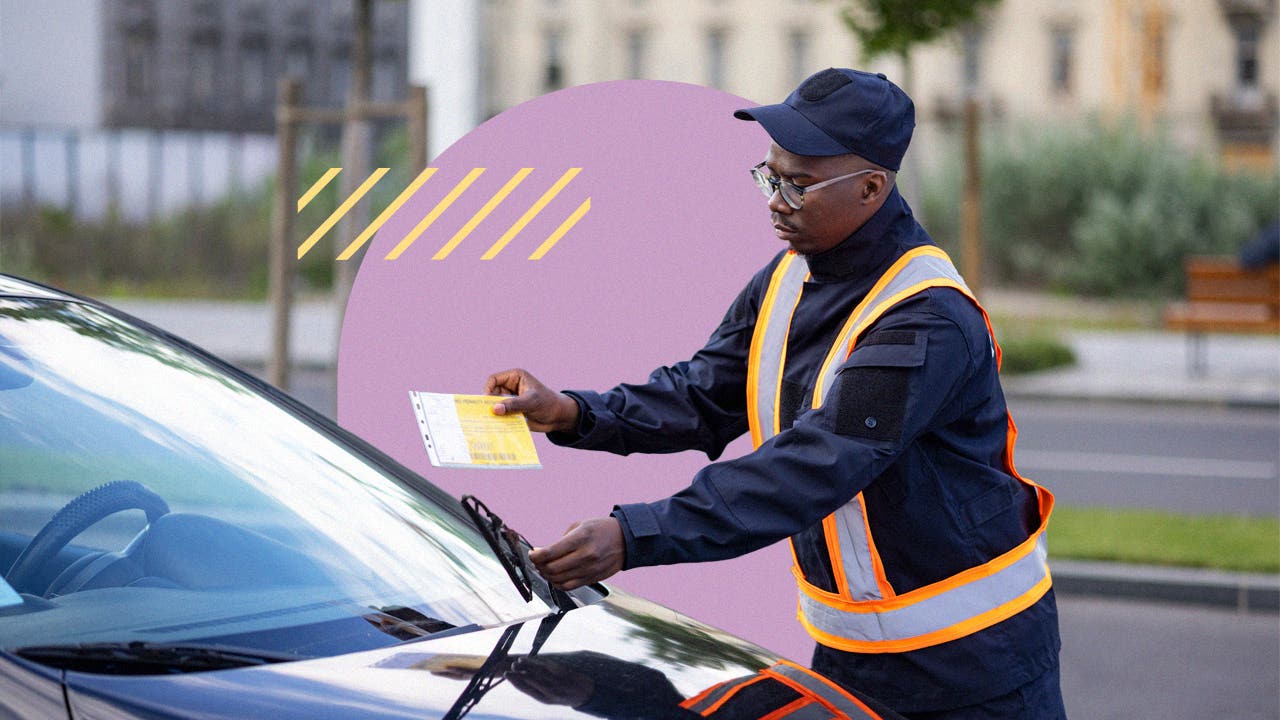Do parking tickets affect insurance rates?

If you’ve gotten dinged for parking in the wrong spot or neglecting to pay the meter, you may wonder if parking tickets affect insurance costs. The short answer is no, but that’s not the whole story. If you take care of your ticket promptly, it should not impact your insurance rate at all. However, a parking citation does affect insurance rates if you allow it to go unpaid, or if you accumulate multiple unpaid tickets and it eventually has an impact on your credit rating. Insurers in most states look at your credit history when determining your rate, and poor credit may lead them to quote you a higher premium.
When parking tickets affect insurance rates
Parking tickets are non-moving violations, which means they do not typically affect your car insurance rates — at least not directly. For example, you may get a parking ticket if you forget to feed the meter or park in the wrong area. Luckily, these tickets are generally not attached to your driver’s license, reported to your state’s DMV or disclosed to your auto insurer. However, if you don’t pay for these types of tickets within the specified time frame, the impact on your credit could eventually cause your car insurance costs to increase.
Do parking tickets make insurance go up?
Only in rare cases does a parking citation affect insurance. Insurers look for moving violations like speeding tickets as indicators of risky driving. Improper parking, on the other hand, doesn’t indicate how safe or unsafe a driver is, only how diligent they are in finding appropriate, legal parking. Parking in the wrong spot is also unlikely to lead to accidents and insurance claims.
But unpaid parking tickets sent to collections could potentially affect your credit-based insurance score. Most car insurance companies will review your credit rating to decide whether to insure you and to determine the cost of your car insurance. That means unpaid parking tickets could affect your premium.
However, in some states — California, Hawaii, Massachusetts and Michigan — laws ban or limit car insurance companies from considering a driver’s credit when calculating rates. In these states, even unpaid parking tickets would likely have no effect on your auto insurance premiums.
How to avoid parking citations leading to increased insurance rates
If you get a parking ticket, it is typically in your best interest to handle the issue right away. If you delay paying your ticket, you could accrue late fees or even risk the city impounding your vehicle.
Instead of ignoring a ticket, consider these options:
- Send a letter to the municipality as soon as possible if you feel the ticket was a mistake, explaining why it may have been unwarranted under the circumstances. Attach a copy of the ticket, your contact information and supporting evidence, such as pictures of a broken meter or of a partially covered or damaged “no parking” sign.
- Talk to the city or county about a payment plan or other arrangements if you cannot pay the ticket right away. The city may be able to freeze further late fees so you can catch up on outstanding fines.
- Ask a family member or friend to lend you money to pay for the ticket. Then, you can pay your family back without worrying about more late fees and collections.
- Pay the ticket at once. Many areas allow you to pay online or via mail, so you can avoid a trip down to your local municipal court.
- Seek a dismissal of the ticket. Some regions offer programs where tickets can be dismissed in exchange for certain actions on your part, such as attending a driver’s education class. You may also be able to get a ticket dismissed if it contains errors, such as the wrong date or an incorrect license plate number. Review your ticket carefully to see if this is the case.
How to prevent parking tickets
The best way to prevent parking tickets is by being careful of where you park. Read nearby signs to ensure you are allowed to park in the area. Some areas have time limits or only allow parking during certain times of the day or specific days of the week.
If you are parking in a metered area, bring plenty of change or use a credit card to feed the meter. Make sure to take note of how much time you have paid to park. A good way to remember is by setting a timer on your phone. Keep in mind you may want to give yourself a few extra minutes to make your way back to your car or add more change to the meter.
If you park in a spot with a broken parking meter, you may have a hard time proving to the local parking official that the meter was faulty. In this case, you might want to consider parking elsewhere if possible.
Some municipal areas now use pay-to-park apps, which are user-friendly and accessible via your smartphone. The apps typically use GPS to determine where you are parked, allow you to pay with a credit card (or Apple Pay, PayPal or something similar) and send you reminders if your time is nearly up so you can extend it if needed.
Lastly, if you receive regular parking citations at home or near work, you might consider making alternative arrangements, such as renting a parking space in a garage, asking your employer for parking assistance or taking public transportation instead.
Other parking ticket consequences
While they generally do not affect car insurance rates, here’s what could happen if you don’t pay your parking tickets:
A boot on your wheel
Some municipalities may place a boot on your vehicle’s wheel to disable it until the tickets are paid. On top of paying for the ticket, you are responsible for paying someone to remove the boot, which can cost $142 or more in major metro areas like New York City.
Late fees
The late fees on unpaid parking tickets can be expensive. If you fail to pay your citation on time, you may have to pay a hefty late fee — in some cases, double the amount of the original fine. Certain places have legislated limits on how much municipalities can charge in late fees, but you may not want to risk accruing past-due charges on your violations.
Getting towed
If your car gets towed and impounded after a number of parking tickets, prepare to spend some serious money to get it back. For example, if your vehicle is impounded in New Orleans, you’d likely have to pay several fees to release your car, including your parking ticket(s), a storage fee of $19 per day (maximum of $500) and a towing fee of $161.
Frequently asked questions
Why we ask for feedback Your feedback helps us improve our content and services. It takes less than a minute to complete.
Your responses are anonymous and will only be used for improving our website.
You may also like

Can I add a car to my insurance that is not in my name?

Does car insurance cover vandalism?






